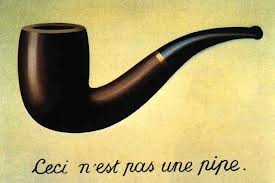We Are Not Our Labels

Labels are useful in the mental health field but we often blur the line between a label and a “condition”. When the lines get blurred we become identified by our label. For some the label is ADHD, for others it’s bi-polar disorder and for the majority of people who experience normal bouts of sadness and pessimism it’s depression. Rene Magritte, the French painter, illustrates the struggle between meaning and language in his painting “This Is Not A Pipe.” It’s a simple painting of a picture of a pipe with the words “This Is Not A Pipe” written in French below it. The contradiction is that it is surely a picture of a pipe but at the same time the painting proclaims that it is not a picture of a pipe at all. So, what is it? One thing we know is that it’s not a real pipe but a representation of one. We can’t touch it or smell it or use it. Paradoxically, even a pipe isn’t a real pipe but rather a wooden vessel carved in a certain way that holds tobacco in its bowl so the smoker can smoke it. It’s just so much easier to call it a pipe. Similarly, it is easier to call a cluster of characteristics that are general to all of us, but more specific to some of us, ADHD or depression. Once we reify our labels we risk becoming the label and not a person who exhibits some of the characteristics that the label represents. I suspect that is Magritte’s point, that we confuse the thing with the label. I suggest that from now on all ADHD medication should have a label on it that says “this is not ADHD medication.” Maybe the contradiction will cause us to think a little more deeply about the meaning of our labels.
Concepts In MotionMar 7th, 20132 comments
2 Comments
Leave a Reply
-
Recent Posts
Categories
Archives
- October 2024
- November 2023
- January 2023
- May 2022
- January 2022
- September 2021
- July 2021
- September 2020
- May 2020
- March 2020
- December 2019
- November 2019
- July 2019
- September 2018
- July 2018
- April 2018
- January 2018
- October 2017
- May 2017
- November 2016
- September 2016
- March 2016
- August 2015
- March 2015
- December 2014
- October 2014
- September 2014
- July 2014
- June 2014
- March 2014
- December 2013
- September 2013
- July 2013
- June 2013
- April 2013
- March 2013
- February 2013
- January 2013
About the Author
Larry Laveman, LCSW, BCD, is a Psychotherapist and Author in Solana Beach, California. His publications include topics on marriage counseling, supervision, mental health and spirituality. He is the former Chief Clinical Director for Harmonium, Inc., a community based nonprofit organization specializing in children, adolescents and families. You can find contact him via Google +, LinkedIn, or this website's contact page.

Larry, I could not agree more! People give other people labels to help them externally understand that individual better. i.e. that person is Catholic, that person works as a lawyer, are those two people dating? These are labels and titles given to people that help “outsiders” come up with a quick schemas of who that individual is.
Thanks for the comment Alex. Labels benefit us greatly in psychology but they come with a significant downside. We need them to categorize, research and understand problems and then, unfortunately, we reduce the person to the label. We rarely apply positive labels and often lose the unique attributes of the person as a result. It’s a difficult dilemma for psychology because diagnosis is label dependent, insurance reimbursement is label dependent, and sharing information is label dependent. Utilizing a strength-based approach hasn’t changed the culture enough to make a difference. We need something more.
Larry